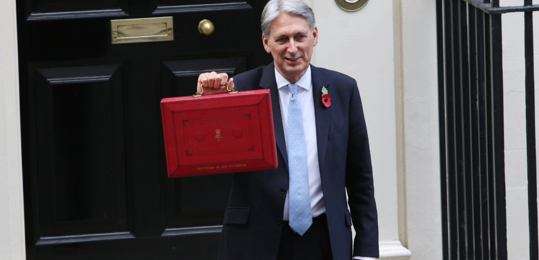The Chancellor of the Exchequer Philip Hammond, kept the presentation of his Spring Statement relatively brief. The uncertainty over Brexit casting clouds over what he outlined as being a positive report on the UK’s economic health.
The Chancellor believed that the economy remained resilient and the Office of Budget Responsibility had forecast it to grow each year over the next 5 years. Inflation was also forecast to stay close to the target and with a reference to the coming parliamentary votes on Brexit, business investment should start growing again once there is certainty over the exit arrangements.
With the unemployment rate continuing to remain low at 4% it is expected to stay at that level for the next few years at least. The Chancellor claimed that with wages increasing at their fastest pace in over a decade and above the rate of inflation, Britain was emerging from its period of austerity.
Public finances had now reached a turning point. Mr Hammond reiterated that this was as a result of this government’s balanced approach of reducing borrowing and debt, while supporting public services, investing in the economy and infrastructure, and keeping taxes low.
He made reference to a number of initiatives to fund cutting-edge science and technology projects and explained how the government is accelerating the shift to a ‘clean economy’ with initiatives to explore how it can help small businesses reduce energy bills and carbon emissions. The environment was not overlooked either with commitments to enhance the natural environment and aid bio-diversity.
Housing and infrastructure held a high priority according to his Statement. He made mention of guaranteeing up to £3bn of housing association borrowing to support the delivery of 30,000 affordable homes. The Housing Infrastructure Fund was also to be unlocked to help the construction of 37,000 houses in London, the Oxford-Cambridge Arc and in Cheshire amongst other locations.
The Spring Statement was used by the Chancellor to announce various public consultations on such diverse matters as Digital Competition, offshore oil and gas decommissioning, a look forward to the National Minimum Wage considerations by the Low Pay Commission, and draft legislation involving tax capital allowances on non-residential structures and buildings.
Some positive news about the Apprenticeship Levy was announced. Proposed changes included in the 2018 Budget are being brought forward. The amount of the levy which larger companies can transfer to smaller firms in their supply chain now rises from 10% to 25% from April 2019.
The contracting industry will be aware of HMRC’s attack on disguised remuneration, including contractor loan arrangements and offshore tax avoidance. The Government is committed to report by 30 March 2019 on the time limits for the recovery of lost tax including those imposed by the 2019 Loan Charge, and to set out its rationale for and the impact of the Charge.
On more immediate matters, Mr Hammond explained that he was going to make funding available for schools and colleges to provide free sanitary products to pupils; to require audit reports in accounts to disclose a business’s performance in paying invoices on time to its small business suppliers and finally on another topical matter, an immediate funding pot of £100m was to be made available to Police forces to pay for overtime to help tackle knife crime.
However, it was a running theme throughout the Statement that the ongoing struggles over Brexit had to be resolved for the country to move forward.
The full response can be found here.

